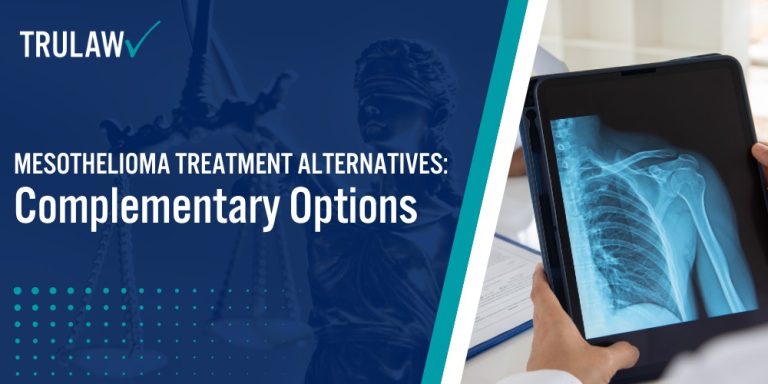Mesothelioma patients are increasingly exploring complementary and alternative therapies to help manage symptoms and improve quality of life during traditional cancer treatment.
While these alternative treatments for mesothelioma are not a cure for cancer, they can provide additional support and relief when used alongside conventional therapies like surgery, chemotherapy, and radiation.
Natural Remedies: CBD, Medical Marijuana, and Herbal Supplements
Natural remedies, such as CBD, medical marijuana, and herbal supplements, have gained popularity among mesothelioma patients seeking alternative ways to manage their symptoms.
These substances may help alleviate pain, nausea, and appetite loss associated with cancer treatment.
Some common natural remedies used by mesothelioma patients include:
- CBD (Cannabidiol): A non-psychoactive compound found in cannabis that may help reduce pain and inflammation
- Medical Marijuana: Contains THC and CBD, which can help manage nausea, pain, and appetite loss
- Herbal Supplements: Certain herbs like ginger, turmeric, and milk thistle may have anti-inflammatory and immune-boosting properties
- Vitamin and Mineral Supplements: Ensuring adequate intake of essential nutrients can support overall health during treatment
It’s crucial for patients to consult with their healthcare team before incorporating any natural remedies into their treatment plan to ensure safety and avoid potential interactions with conventional therapies.
Physical Therapies: Cupping and Exercise During Cancer Treatment
Physical therapies, such as cupping and exercise, can help mesothelioma patients manage pain, improve circulation, and maintain muscle strength during treatment.
These complementary therapies may also help reduce stress and promote overall well-being.
Some physical therapies that may benefit mesothelioma patients include:
- Cupping Therapy: Involves placing cups on the skin to create suction, which may help reduce pain and inflammation
- Exercise: Low-impact activities like walking, yoga, and tai chi can help maintain muscle strength and improve mood
- Massage Therapy: Can help alleviate pain, reduce stress, and improve circulation
- Transcutaneous Electrical Nerve Stimulation (TENS): A device that delivers mild electrical currents to help manage pain
Patients should work with a qualified physical therapist or healthcare provider to develop a safe and effective exercise and therapy plan tailored to their individual needs and treatment goals.
Mind-Body Interventions for Cancer Patients
Mind-body interventions, such as meditation, acupuncture, and hypnosis, can help mesothelioma patients manage stress, anxiety, and pain during treatment.
These complementary therapies focus on the connection between the mind and body, promoting relaxation and emotional well-being.
Some mind-body interventions that may benefit mesothelioma patients include:
- Meditation: Helps reduce stress, anxiety, and pain by focusing the mind on the present moment
- Acupuncture: Involves inserting thin needles into specific points on the body to help manage pain and other symptoms
- Hypnosis: A state of deep relaxation and focused attention that may help reduce pain and anxiety
- Art and Music Therapy: Creative outlets that can help patients express emotions and cope with the challenges of cancer treatment
Incorporating mind-body interventions into a comprehensive treatment plan can help mesothelioma patients maintain a positive outlook and improve their overall quality of life.
Nutritional Approaches in Mesothelioma Management
Proper nutrition is essential for mesothelioma patients undergoing treatment, as it can help support the immune system, maintain energy levels, and promote healing.
A balanced diet rich in fruits, vegetables, lean proteins, and whole grains can provide the nutrients needed to support overall health.
Some nutritional approaches that may benefit mesothelioma patients include:
- Anti-inflammatory Diet: Focuses on foods that reduce inflammation in the body, such as fatty fish, leafy greens, and berries
- Plant-based Diet: Emphasizes fruits, vegetables, whole grains, and legumes, which are rich in antioxidants and fiber
- Protein-rich Diet: Adequate protein intake is crucial for maintaining muscle mass and supporting the immune system during treatment
- Hydration: Staying well-hydrated can help manage side effects like fatigue and constipation
Working with a registered dietitian who specializes in oncology nutrition can help mesothelioma patients develop a personalized meal plan that meets their unique needs and preferences.
Emerging Complementary Treatment Options
As research continues to explore the potential benefits of alternative mesothelioma treatments, new complementary therapies are emerging that may help improve patient outcomes and quality of life.
Some of these emerging options include targeted therapies that aim to specifically attack cancer cells while minimizing damage to healthy cells.
Some emerging complementary treatment options for mesothelioma include:
- Immunotherapy: Harnesses the power of the immune system to fight cancer cells
- Gene Therapy: Involves modifying or replacing faulty genes that contribute to cancer growth
- Photodynamic Therapy: Uses light-sensitive drugs and laser light to destroy cancer cells
- Clinical Trials: Offer patients access to new and innovative treatments that are not yet widely available
Mesothelioma patients interested in exploring emerging complementary therapies should discuss their options with their healthcare team and consider participating in clinical trials when appropriate.



